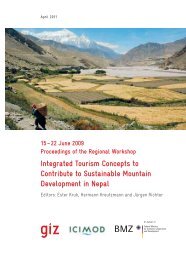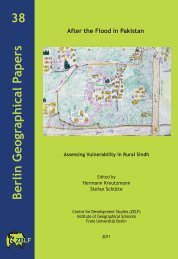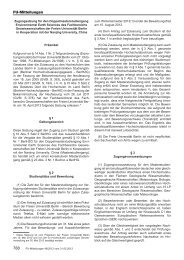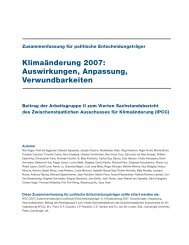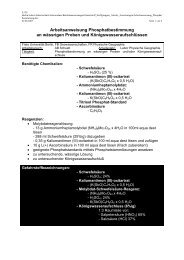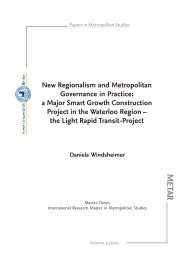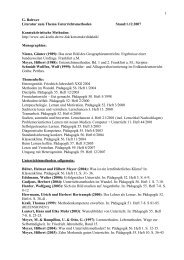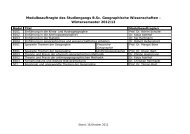Pastoralism and Rangeland Management on the Tibetan Plateau in ...
Pastoralism and Rangeland Management on the Tibetan Plateau in ...
Pastoralism and Rangeland Management on the Tibetan Plateau in ...
Create successful ePaper yourself
Turn your PDF publications into a flip-book with our unique Google optimized e-Paper software.
�������������������������������<br />
����<br />
����<br />
����<br />
����<br />
����<br />
����<br />
����<br />
����<br />
����<br />
����<br />
250<br />
���� ���� ���� ���� ���� ���� ���� ���� ����<br />
����<br />
����� ������ ����� ����� �������� ��������<br />
Source: data adapted from Ch<strong>in</strong>a Statistics Press 2009, 2010<br />
Figure 7: Annual <strong>in</strong>come per capita of rural residents <strong>in</strong> pastoral area of TAR.<br />
Unit: Yuan (RMB)<br />
5 Driven Factors to social <str<strong>on</strong>g>and</str<strong>on</strong>g> ec<strong>on</strong>omic Changes<br />
5.1 Support from priority policies<br />
S<strong>in</strong>ce 1980, <strong>the</strong> central government has held five Tibet Work Symposiums to<br />
deal with <strong>the</strong> socio-ec<strong>on</strong>omic development of <strong>the</strong> TAR. The central government’s<br />
transfer of fiscal payments to Tibet is a major way <strong>in</strong> which it is try<strong>in</strong>g<br />
to help to improve Tibet’s development. The m<strong>on</strong>ey transferred to Tibet from<br />
1959 to 2008 accounted for 201.9 billi<strong>on</strong> Yuan, <strong>in</strong> which about 76.3 % was<br />
c<strong>on</strong>tributed between 2001 <str<strong>on</strong>g>and</str<strong>on</strong>g> 2008, thus mak<strong>in</strong>g up 93.7 % of <strong>the</strong> TAR’s<br />
f<strong>in</strong>ancial revenue <strong>in</strong> <strong>the</strong> same period (Ch<strong>in</strong>a Statistics Press 1990). In <strong>the</strong><br />
past two decades, some of <strong>the</strong> transfer payments were provided <strong>in</strong> <strong>the</strong> form of<br />
<strong>in</strong>vestments <strong>in</strong> development projects <strong>in</strong> Tibet. Thus, a total of 1,145 projects<br />
have been carried out <strong>in</strong> Tibet <strong>in</strong>clud<strong>in</strong>g projects that addressed: envir<strong>on</strong>mental<br />
protecti<strong>on</strong>, transportati<strong>on</strong>, tourism development, niche products <str<strong>on</strong>g>and</str<strong>on</strong>g> market<strong>in</strong>g<br />
development, poverty alleviati<strong>on</strong>, natural hazards preventi<strong>on</strong>, improvement<br />
of native rangel<str<strong>on</strong>g>and</str<strong>on</strong>g>s <str<strong>on</strong>g>and</str<strong>on</strong>g> feed<strong>in</strong>g systems, breed improvement, payments for<br />
ecosystem services <str<strong>on</strong>g>and</str<strong>on</strong>g> a series of <strong>in</strong>frastructure projects related to agriculture<br />
<str<strong>on</strong>g>and</str<strong>on</strong>g> pastoral sectors that took place <strong>in</strong> <strong>the</strong> middle valleys of <strong>the</strong> Yarlung Zangbo<br />
River <str<strong>on</strong>g>and</str<strong>on</strong>g> <strong>the</strong> Lhasa <str<strong>on</strong>g>and</str<strong>on</strong>g> Nyangqu Rivers s<strong>in</strong>ce 1990.<br />
In recent years, more attenti<strong>on</strong> has been paid to improv<strong>in</strong>g pastoral <str<strong>on</strong>g>and</str<strong>on</strong>g> agricultural<br />
development through <strong>the</strong> provisi<strong>on</strong> of huge subsidies for productive<br />
materials such as seeds, chemical fertilizers, mach<strong>in</strong>ery, diesel oil, etc. This enables<br />
farmers <strong>in</strong> Tibet to purchase <strong>the</strong>ir materials for pastoral <str<strong>on</strong>g>and</str<strong>on</strong>g> agricultural



